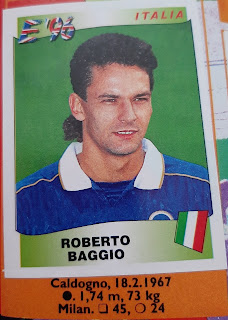132: Marco Boogers, West Ham United, 1996 Pro Match Soccer
A few months ago I set cover work for a Year 7 class while I attended a course. In amongst the tasks set was a short Google Quiz including a multiple choice question about the rough date range of the “medieval era”. When I checked my emails after the course I was informed by one student that I was wrong about when the medieval era had occurred because they had Googled it and it had actually ended in 1450 rather than the c.1500 I had suggested. Thanks for that one Google.
The Internet has massively shaped the way we communicate and has given us access to a plethora of information. As a teacher it’s probably preferable to receive polite emails informing me of my incompetence from my students rather than being subjected to a torrent of verbal abuse in the classroom but the trust all of us put in search engines is remarkable. Firstly the definition of the “medieval era” depends massively on the part of the world you are studying at the time. Secondly there is often more than one correct answer in history. Thirdly sometimes the Internet gets it wrong.
This is hardly unique to the information superhighway. Back in 1986 the ClubCall service was launched allowing football fans up to the minute news from their favourite teams for a mere 32p a minute (or 88p in today’s hyperinflated economy). As well as providing supporters with goal updates it was also the first port of call, providing you had the bill payer’s permission, for injury and transfer news and interviews with managers and players. The marketing men knew how to grab people’s attention with vague headlines about “sensational deals” for “Premier League stars” shared on the late twentieth century staple Teletext. The service cashed in in 1995 when anxious Southampton and Chelsea fans flocked to their phones to hear more about Matt Le Tissier’s rumoured move to Stamford Bridge despite both clubs’ staff dismissing the deal outright. The unwieldy nature of the operation also meant that West Ham United fans were treated to an expletive-laden training ground interview with Paul Ince but perhaps the most unfortunate victim of ClubCall was the Hammers’ Dutch striker Marco Boogers.
In a classic Harry Redknapp deal Boogers was brought to the Boleyn Ground for £1.5m in July 1995 despite the manager having never seen the forward play. After a substitute appearance in the opening game of the season against Leeds United, where the Hammers were defeated by two Tony Yeboah goals, he came off the bench against Manchester United and had an instant impact on the game. Within minutes of entering the field of play Boogers inflicted a knee-high tackle on Gary Neville and was given his marching orders. He was handed a four-match ban and was subjected to intense media scrutiny, with The Sun leading its sport pages with ‘Horror Tackle’ the day after the game, leading to Redknapp granting the homesick striker a leave of absence. It’s here that ClubCall came to the fore.
The service relied heavily on local journalists who were often required to cover several clubs in a certain area. When West Ham’s allocated reporter got in touch with the club’s PA and travel arranger Bill Prosser to see if he could get an interview with Boogers he was updated with the striker’s absence and informed “if he has gone back to Holland, he's probably gone by car again”. ClubCall’s man misheard this as “he's probably gone to his caravan” and soon Hammers’ fans were haemorrhaging their hard earned cash for mental visions of their new signing taking some time out at the Netherlands’ answer to Camber Sands. Worst still the ever diligent sports team at The Sun got wind of the story and their back page led with ‘Barmy Boogers Living in a Caravan’ along with speculation about the forward’s deteriorating mental health.
Boogers returned to West Ham and made just two more substitute appearances, in defeats to Aston Villa and Blackburn Rovers, before a worsening knee injury ended his season. He again returned to the Netherlands during which time Harry Redknapp had brought in the impossibly handsome Iain Dowie and Boogers’ time at Upton Park came to an end. After a loan spell at Groningen where injury prevented him making a single appearance he played nine games for RKC Waalwijk before closing out his career with profitable spells at FC Voldendam and Dordrecht resulting in 91 goals in 179 games. He moved upstairs at Dordrecht as the club’s technical director where his fourteen years saw him serve briefly as interim manager, clash with manager Jan Everse and feature as the protagonist in Stef de Bont’s book ‘Koning van de Krommedijk’ chronicling the club’s relegation from the Eredivisie in the 2014/15 campaign.
Marco Boogers is undeniably a colourful character and clearly offered a lot more than was seen in his four appearances at West Ham. In the same season as Andrea Silenzi and William Prunier failed to make an impact on the Premier League, however, he became another cautionary tale of poorly scouted foreign imports. How much of that was down to a hastily posted update on ClubCall is open to speculation but perhaps the real lesson here is to always double check your news stories. Or, if in doubt, just ask Google.





Comments
Post a Comment